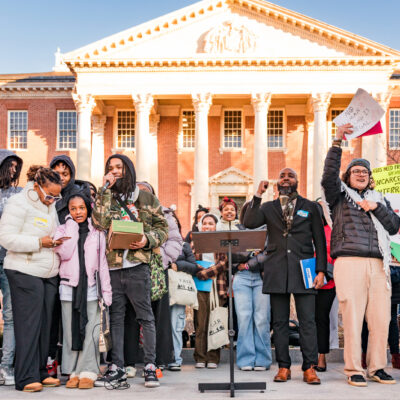News & Commentary
Latest Event
Day of Action 2026: We Keep Us Safe!
We Keep Us Safe! Protect Our Rights!
DAY OF ACTION to protect our immigrant communities and end Maryland's collusion with ICE!
Join the ACLU of Maryland and our partners for a Day of Action on Monday, February 16, in Annapolis. We’ll gather at Lawyer's Mall to demand justice for our immigrant communities and safety for ALL Marylanders. Together, we’ll hold a vigil followed by a rally to amplify our calls for real, meaningful action. Please plan to arrive by 5:00 PM.
Your leadership is crucial here. Be part of the movement to protect civil liberties in Maryland and RSVP today!

2 WEEKS TO GO! Education Legislative Updates
The “Blueprint for Maryland’s Future” (HB1413/SB1030) bill is the first action on recommendations from the Kirwan Commission. The bill as introduced includes funding for expanding pre-kindergarten, increasing teacher salaries, and providing grants for concentrated poverty and special education. The ACLU testified in support of this bill, urging state legislators to develop a targeted and comprehensive formula which is the only way to seriously begin to combat decades of gross underfunding for students and families. As of now, the Kirwan “Blueprint” bill is pending the results of the State Budget process. Currently, the House and Senate versions of the budget (SB125/HB100) do not match. Only the House version of the budget funds the entire Kirwan “Bluep

Maryland Family in Court Fighting ICE’s Bait and Switch Tactic
On March 15, Ms. Hui Fang Dong and her three children— ages 14, 11, and 9 — appeared before Judge George Hazel at the United States District Court in Greenbelt to fight ICE’s cruel “bait and switch” tactic. Her husband, Wanrong Lin, himself could not be present because he was working at their family restaurant in St. Mary’s County, and because he was scared of what might happen if he entered another government building again.

MAREE Responds to Kirwan Commission’s ‘Blueprint’
This piece originally appeared at in the Afro.

The Cruel and Archaic Practice of “Restrictive” Confinement
On March 12, the Maryland Judiciary Committee considered HB 1001/ SB 774, which would limit the use of “restrictive housing” – the State’s term for solitary confinement – on children.

Let’s Pass the LETT Act for Greater Police Accountability in Montgomery
On June 11, 2018, a Montgomery County police officer fatally shot Robert White, an unarmed Black man who was walking in his own neighborhood. So far, no one has been held accountable for his death. Shamefully, this is not surprising. An ACLU report found that between 2010-2015, at least 130 people across Maryland died in police encounters. Eleven of those individuals were in Montgomery County. There was no accountability: Police were criminally charged in less than 2% of those cases.

Students in Baltimore Also Have Dreams
Deshawna Bryant, a senior at Baltimore City High School, dreams of becoming a child psychologist. The youngest in her family, all her life Deshawna’s parents opened their home and hearts to many foster children, too. After high school, she plans on going to a university in Florida, and a big reason why is that it’s warm there all year round.

Celebrating Love and Family this Valentine’s Day
This Valentine’s Day, the ACLU of Maryland is celebrating the love between Mr. Wanrong Lin, and Ms. Hui Fang Dong, a courageous Maryland couple recently reunited by a federal judge after ICE used an unlawful “bait and switch” strategy to lure them into a meeting with ICE officials offering assistance in the immigration process, then switched tracks and threw Mr. Lin into jail and deportation proceedings.
By Nick Taichi Steiner

Increasing education funding is not a luxury
This piece originally appeared at The Baltimore Sun.Leslie Seid Margolis is managing attorney at Disability Rights Maryland. Contributors to this op-ed include: Cheryl Bost, Maryland State Education Association president; Shannen Coleman-Siciliano, Strong Schools Maryland co-executive director; Kimberly Humphrey, ACLU of Maryland legislative counsel; and Jane Sundius, Attendance Works senior policy fellow.As statewide advocates for education and equity, we were deeply disappointed by the decision to delay consideration to revise Maryland’s school funding formula. This decision has made it all the more important that the General Assembly and the governor make immediate, meaningful progress on committing additional funding to our schools as prescribed by the Kirwan Commission.Our elected leaders must ensure that urgently needed school funding increases are secured in this 2019 legislative session — even though determination of the formulas has been deferred until the 2020 session.Maryland should also learn from its previous experience revamping education funding. In 2002, the legislature and governor approved recommendations of the Thornton Commission but left decisions about how much money to allocate or where to find it until the following year. The result was that expectations for programming and outcomes were consistent with the Thornton Commission’s recommendations, but funding was not. Not only was the reform effort underfunded initially, funding in subsequent years failed to cover inflationary increases, which had a compounding effect over time. By 2016, the state’s own analysis estimated the annual funding deficit at $2.9 billion, or an average of $2 million per school.Class sizes are increasing across the state, sometimes to as many as 40 students. Fewer resources are available for critical supports such as counselors, course offerings are slimmed down, and field trips and other enrichment activities are eliminated. And, at the same time that educators are expected to shoulder the burden of reduced funding, they are also expected to help students to meet increased state and federal education standards — all without the salary increases their profession deserves. A recent survey found that more than four in 10 Maryland educators work a second job to make ends meet.Even worse, an independent analysis by Education Trust revealed that Maryland is shortchanging schools in poor communities more than those in affluent ones. Increasingly strong research shows that the impact of poorly funded schools is much greater for students who lack the home and community resources to make up for public education cuts, who require special educational supports to be successful, who suffer from institutional and individual biases and racism and who are recent arrivals to our nation. Their lack of experienced teachers, up-to-date materials and computer access reveals Maryland’s inequitable educational opportunities.To continue reading this piece at the Baltimore Sun, click here.

Stay Informed
Sign up to be the first to hear about how to take action.
By completing this form, I agree to receive occasional emails per the terms of the ACLU’s privacy statement.
By completing this form, I agree to receive occasional emails per the terms of the ACLU’s privacy statement.



